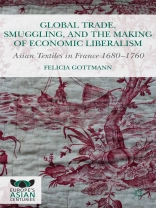Imported from India, China, the Levant, and Persia and appreciated for their diversity, designs, fast bright colours and fine weave, Asian textiles became so popular in France that in 1686 the state banned their import, consumption and imitation. A fateful decision. This book tells the story of smuggling on a vast scale, savvy retailers and rebellious consumers. It also reveals how reformers in the French administration itself sponsored a global effort to acquire the technological know-how necessary to produce such textiles and how the vitriolic debates surrounding the eventual abolition of the ban were one of the decisive moments in the development of Enlightenment economic liberalism.
สารบัญ
Introduction
PART I: GLOBAL TEXTILES
Prologue – Three French Women and their Troublesome Textiles
1. Global Fabrics: The French Trade in Asian and Asian-Style Textiles
PART II: SMUGGLING
2. Smuggling Textiles into France
3. Smuggled Textiles Worn in France: The Politics of Privilege and the Violence of Fashion
PART III: THE MAKING OF ECONOMIC LIBERALISM
4. The State of Knowledge
5. Enlightenment Campaigning
Conclusion
Bibliography
Appendix I-IV
เกี่ยวกับผู้แต่ง
Felicia Gottmann is Leverhulme ECR Fellow at the University of Dundee’s Scottish Centre for Global History, UK. After receiving her D.Phil from Oxford University in 2010, she was a Research Fellow on the ERC-funded project ‘Europe’s Asian Centuries: Trading Eurasia 1600-1830’ at the University of Warwick.












